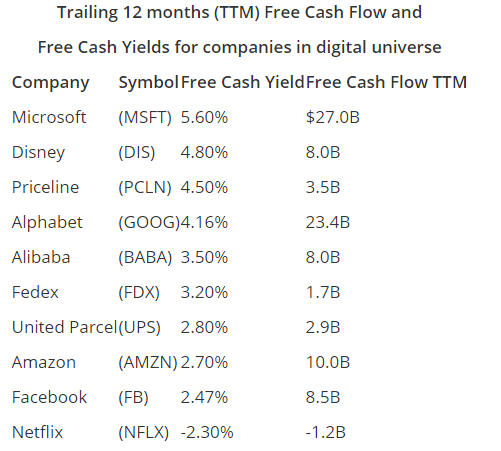Why Could Microsoft be the First Trillion-dollar Tech Company?
The debate on who will be the first trillion-dollar technology company started when Amazon and Microsoft were both cited as the companies most likely to reach a $1 trillion market capitalization by analysts. RBC Capital Managing Director Mark Mahaney predicted earlier this month that Amazon will reach the $1 trillion mark first, while Analyst Michael Markowski of Equities.com predicted that Microsoft will reach that threshold before other big companies like Amazon, Google, Facebook and Apple.
Michael Markowski was previously named by Fortune as one of its “top 50 greatest investors” and correctly predicted the bankruptcy of investment firm Lehman Brothers Holdings Inc. one year before it actually happened. The primary argument behind his prediction is that Microsoft’s $26 billion purchase of LinkedIn will propel the company to become a leader in the social media and crowdfunding industries. How exactly will LinkedIn help, you might ask? Well, the new ruling by the U.S. Securities & Exchange Commission announced earlier this year will allow more online crowdsourcing of startups, meaning that companies will be able to advertise directly to prospective individual investors. Considering LinkedIn has a database of more than 467 million people, Microsoft has a competitive edge. On that note, the user base for the platform, he predicts, will swell to nearly 700 million by 2020. According to Markowski, the social investing industry is the key to driving crowdfunding.
predicted the bankruptcy of investment firm Lehman Brothers Holdings Inc. one year before it actually happened. The primary argument behind his prediction is that Microsoft’s $26 billion purchase of LinkedIn will propel the company to become a leader in the social media and crowdfunding industries. How exactly will LinkedIn help, you might ask? Well, the new ruling by the U.S. Securities & Exchange Commission announced earlier this year will allow more online crowdsourcing of startups, meaning that companies will be able to advertise directly to prospective individual investors. Considering LinkedIn has a database of more than 467 million people, Microsoft has a competitive edge. On that note, the user base for the platform, he predicts, will swell to nearly 700 million by 2020. According to Markowski, the social investing industry is the key to driving crowdfunding.
“The public has an insatiable appetite for making small bets and purchasing lottery tickets, etc., that provide the chance to make a big profit,” Markowski wrote. “The millennials will be a good example. Many will want to routinely invest $100 or even less into high-risk ventures that could produce returns of 10X to 100X.”
He also has a bold prediction on the Social Investing Community (SIC) industry, saying that even though today, the SIC industry is in its infancy, it will rank in size and scope right along with the digital search and social media industries by 2025.
As of Monday, Microsoft held the third largest market cap while Apple remained the most valuable tech company in the world:
- Apple: $622.6B
- Alphabet: $549.7B
- Microsoft: $489.3B
- Amazon: $358.7B
- Facebook: $337.6B
Another important advantage is that the company has the highest free cash yield of all of the "First to a Trillion" contestants. What does that mean? Well, free cash basically demonstrates the amount of money after capital expenditures that a company can utilize, to make acquisitions or invest in business improvements. Here’s the list made by Markowski based on the companies’ market cap and share price:

Microsoft is Cool Again
While so many tech companies like Samsung, Apple, and Google had a hard year, Microsoft remarkably  stood out in the space for all the right reasons this year. First, the company beat earnings expectations for the Q4 2016 and the company stock hit an all-time high in October. Throughout the year, the company announced many updates, both on the software and hardware fronts. On the software front, the major updates to Windows 10 and Windows 10 Creators were significant, as the company got Windows 10 on hundreds of millions of devices, whereas, on the hardware front, a new Surface Book, Surface Book i7 and Microsoft Surface Studio garnered great attention from consumers. Furthermore, the company has come to embrace the cloud, garnered more open source contributors on GitHub than Facebook, Docker, Google and Angular as it open sourced a couple of its tools and engines, launched a rival to Slack, completed its biggest acquisition ever, and rolled out a program to create low-cost VR headsets.
stood out in the space for all the right reasons this year. First, the company beat earnings expectations for the Q4 2016 and the company stock hit an all-time high in October. Throughout the year, the company announced many updates, both on the software and hardware fronts. On the software front, the major updates to Windows 10 and Windows 10 Creators were significant, as the company got Windows 10 on hundreds of millions of devices, whereas, on the hardware front, a new Surface Book, Surface Book i7 and Microsoft Surface Studio garnered great attention from consumers. Furthermore, the company has come to embrace the cloud, garnered more open source contributors on GitHub than Facebook, Docker, Google and Angular as it open sourced a couple of its tools and engines, launched a rival to Slack, completed its biggest acquisition ever, and rolled out a program to create low-cost VR headsets.
There is no doubt that Microsoft’s Chief Executive Officer Satya Nadella, who is now entering his third year at the company’s helm, has had a huge role in the company’s unprecedented progress and helped to rebuild the company’s reputation for making it cool again!
"Microsoft is focused on building market-leading, category-changing products. They seemed to have seized that mantle from Apple," said Forrester Research analyst J.P. Gownder.
How Microsoft will Shape Enterprise IT in 2017
Cloud
Microsoft announced that its Azure public cloud saw its revenue go up 116 percent year over year in the quarter that ended on September 30. Computer usage also doubled year over year, Microsoft said. However, Azure is still the second only to Amazon Web Services (AWS), which generated $2.88 billion in revenue in the second quarter of this year, up 58 percent year over year. And, it was the most revenue AWS has ever captured in a quarter. IBM’s share was about 8 percent, Google Cloud’s was about 5 percent, and the remainder was collectively consumed by 12 or more companies.
Despite the heated battle between Microsoft and Amazon.com for cloud supremacy, Azure has certainly been a big part of Microsoft’s resurgence. According to the industry insiders, Azure and the rest of Microsoft’s cloud will become increasingly important as part of any IT management policy, with key features in the upcoming Creators Update for Windows 10 relying on cloud services to handle security reports and for software delivery.
The cloud will be a big part of Microsoft’s 2017, and one of Microsoft’s big deliverables is expected to be its Azure Stack “cloud in a box” combination of software and third-party server hardware. Both Dell and HP have announced that they’ll ship Azure Stack racks midyear; Microsoft has recently delivered a second preview build for proof-of-concept deployments. Azure Stack is Microsoft's system for building private clouds that run the same software it uses in its public cloud, and Microsoft has been pushing Azure Stack as a differentiator of its cloud platform.
It will be interesting to see how enterprises will take advantage of the new updates to Azure and whether the cloud platform will finally catch up to Amazon Web Services in 2017.
Enterprise Software and Products
By launching Windows 10 Creators Update, a new Surface Book, Surface Book i7, and Microsoft Surface Studio, Microsoft made a big splash in terms of enterprise software and products.
Since messaging apps have evolved beyond simple text communication tools to include commerce, file sharing, artificial intelligence and more, the collaboration will be another important theme for Microsoft in 2017. As you may already know, it launched Teams, a group messaging service that's similar to Slack, but unlike its rival, the productivity app is tightly integrated into Office 365, as well as Power BI and Skype with plenty of features for easy communication and collaboration in the workplace. With its advanced functionality, users can simply reply to a message on a channel by clicking on the reply button and anyone else can join the thread whenever they want.
Artificial Intelligence
In late September, Microsoft says it has formed a new 5,000-person engineering and research team to focus on its artificial intelligence products, and the division will be led by Microsoft Research chief Harry Shum. It is important that Microsoft appears to be investing heavily in what it sees as the future of computing. By creating this division, the tech giant will leverage its key AI innovations, like its Cognitive Services APIs and Skype Translator service, as well as roll out new AI powered products.
Microsoft is taking a four-pronged approach to its initiative to democratize AI:
-
Agents: Harness AI to fundamentally change human and computer interaction through agents such as Microsoft’s digital personal assistant Cortana
-
Applications: Infuse every application, from the photo app on people’s phones to Skype and Office 365, with intelligence
-
Services: Make these same intelligent capabilities that are infused in Microsoft’s apps —cognitive capabilities such as vision and speech, and machine analytics — available to every application developer in the world
-
Infrastructure: Build the world’s most powerful AI supercomputer with Azure and make it available to anyone, to enable people and organizations to harness its power
The company has been struggling with its digital voice assistant, Cortana. However, now that Microsoft already migrated Cortana to iOS, in 2017, Cortana is expected to break even further out of its PC shell.

Microsoft should leverage what’s made it so strong in the last two years. If its recent fearless approach to product and innovation continue into 2017, it may turn out that Michael Markowski is right again about Microsoft being the first trillion-dollar technology company. I also believe next year we'll start to see all the efforts made for Windows 10 come to fruition. Lastly, speaking in a new interview, Microsoft CEO Satya Nadella commented on Microsoft's current position in the phone business, hinting that the company may be working on the "ultimate mobile device." So I wonder if that will happen in 2017.

Venus Tamturk
Venus is the Media Reporter for CMS-Connected, with one of her tasks to write thorough articles by creating the most up-to-date and engaging content using B2B digital marketing. She enjoys increasing brand equity and conversion through the strategic use of social media channels and integrated media marketing plans.